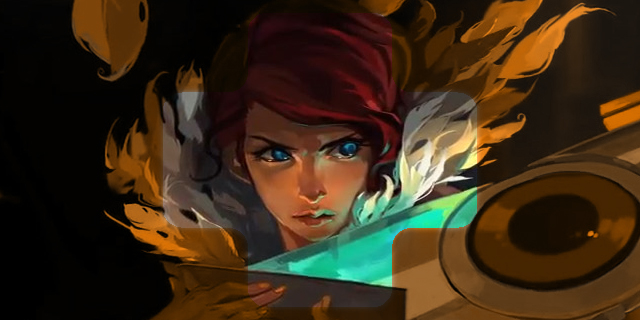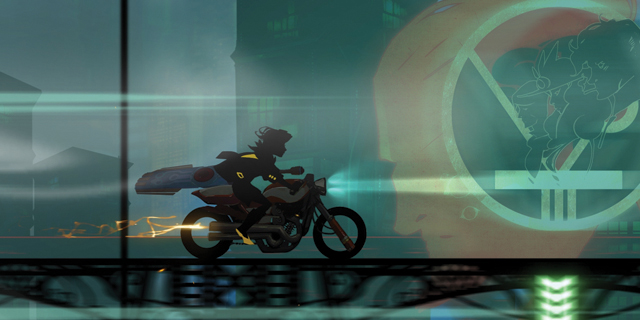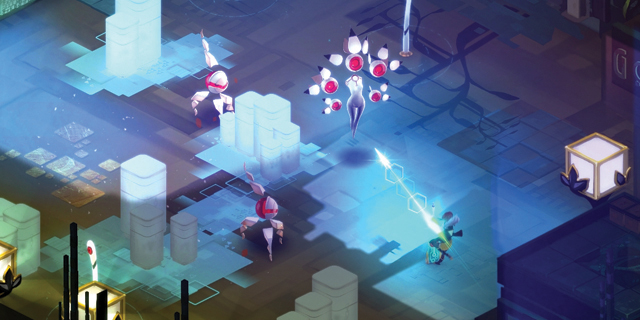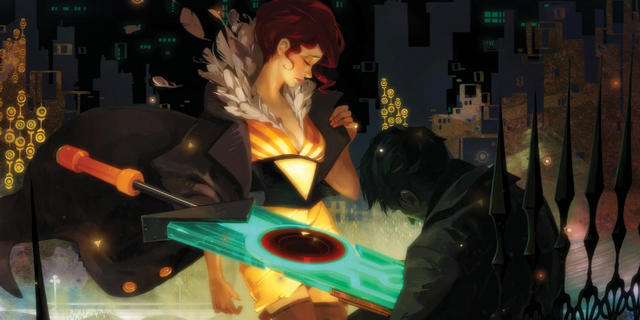
Spoilers for Transistor ahead! Don’t read on if you haven’t finished the game and want to keep those last moments a complete surprise.
Let’s talk about Transistor. It’s a game I love, but not entirely for the reasons I expected to. At first, I found myself put off by its combat and story that seemed to constantly keep you far enough away to learn anything. Slowly but surely the pieces began to fall into place, revealing a late game section that began to change things dramatically. But this isn’t about those moments. This is about two characters and most importantly how Supergiant managed to turn an unorthodox relationship into the game’s greatest strength.
As with Bastion before it, there are plenty of worthwhile moments prior to its ultimate conclusion, but its conclusion is, ultimately, what matters most.
Throughout your adventure with Red, the singer who lost her voice, and your talking sword pal, the Transistor, you slowly piece together moments that reveal parts of their pasts. With each new bit of dialogue, you find yourself understanding more about these two and why exactly they are in this bizarre situation. You begin to grasp how important Red is to the Transistor and vice-versa, giving you a perspective that they are, perhaps, more than friends.
You never truly know who the man inside of the Transistor was prior to his imprisonment, but that mystery never becomes one that necessitates a solution. He risked his life to same someone he cares about deeply and as a result learns to live with the unexpected consequence. He does this knowing full well he’ll have Red on his side for at least a little bit longer. Red, unable to speak, uses computer terminals you find scattered throughout the city to offer some sparse moments of character, giving you a perspective outside of the Transistor’s. These moments are both welcome and powerful, providing more characterization through brief lines of text than most games have in their entire 10-plus-hour-long stories.

Despite Red’s inability to communicate in most situations, you never feel alone. The Transistor is there to keep you, and by extension, Red, company, but you always sense he wishes he could do more. His words aren’t meaningless filler either; they both fill in the gaps of the story you desperately wish to learn more about and also provide a perspective on his character as he learns to cope with his situation. Will he ever become whole again? Will Red be safe without his protection? Or is he the one that needs protecting? Most importantly, will seeking revenge on those who did this to them really bring them, and this seemingly chaotic city, peace?
Eventually, after witnessing Cloudbank, the city you spend all of your time, slowly destroy itself to bits, you encounter the last person you wish to kill for what he did: Royce. Through plenty of exposition, those rare moments where the Transistor is as unable to speak as Red is, you learn about Royce’s mission and the entire background behind what exactly is happening to Cloudbank. It feels like information that could have been better scattered throughout the game, but it also provides you with the necessary knowledge to fully grasp the world and these characters without beating you over the head with it. What you seek is provided, but still distant enough to keep you wanting more.
This is what is brilliant about Transistor’s approach to story, despite how lackluster it seems during those opening hours. Yes, it keeps most of those big story moments tucked away until the end, but it’s structured as such to allow the narrative to breathe and stay focused on Red and the Transistor. Their relationship is still the core of the experience and Supergiant never forgets it, although by the end you might be less focused on them and more focused on the crazy events that unfold with Royce’s dialogue.

After entering the Transistor along with Royce (and an intense battle between him and Red), Royce is killed and his soul trapped inside of the sword alongside the man who accompanied you throughout the entire journey. Red is sent back to the real world, with the talkative Transistor in tow, and given the power to rebuild Cloudbank, something Royce so desperately desired yet never could attain. Red won; she accomplished her goal and had the power to save the world she desperately clung to. Yet, she didn’t want it. She realized, in the end, Cloudbank wasn’t truly worth saving.
So, in a brutal final move, she impales herself with the Transistor as it pleads with her to stop, thus allowing her to live inside of it with the one she cares about most. She leaves behind a dying world because she knows, deep down, it’s broken and cannot ever be fixed. The people, the ones you learned about leading up to those last minutes of gameplay, were the heart of Cloudbank. Without them, Cloudbank is just as empty as Red is without the man who sacrificed himself to protect her.
The reaction to this ending is mixed and I think I understand why. Boiling it down makes it seem like a selfish move on Red’s part. She could have done more to protect the city she once called home. Or perhaps let Royce win their final battle, allowing him to be the savior of the city he desired to become. But she chose revenge and her own future with the one she loves rather than an existence among the dead, even if it means killing herself to get it. It’s a downright brutal, almost nihilistic ending about, well, death. Most importantly, it’s a story of two people trapped in a world where the only escape is death. It’s not a happy ending, but even with the beautiful montage of portraits following Red’s death, it never once pretends to be.

Transistor’s ending is a brilliant conclusion to an otherwise-basic tale of love and loss, but it also speaks to how shocking an ending can be without really doing anything all that surprising. Red’s final action didn’t hit me because it seemed completely out-of-left-field for her character. In fact, it was exactly what I would have expected, but I was blinded by the bigger picture. None of it mattered, at least not in this particular story. Everything that Cloudbank was died right before the game’s opening moments. What was left was a carcass of a city that attempted to live on, but continually failed, hitting us with tales of its past along Red’s personal journey.
Bastion managed to showcase how important world building mattered, even in a world seemingly surrounded by death. Transistor, on the other hand, demonstrated the exact opposite: the world was gone for good, but gave you enough of a glimpse of its former glory to keep you wanting to learn more. Then, when the time comes for those final moments to play out, you are hit with the realization that Red’s story was, in fact, Red’s story, and everything else was just background noise.
This is why I love Transistor and why many can learn from its approach to storytelling. While you might love the gameplay more than I did, you might find yourself struggling to care about the story even if, on the surface, it’s undeniably fascinating. It’s a game with a narrative which begs you to replay it, even after witnessing its heartbreaking finale.
One can only hope we see more game narratives demonstrate this level of bravery in the future.



















